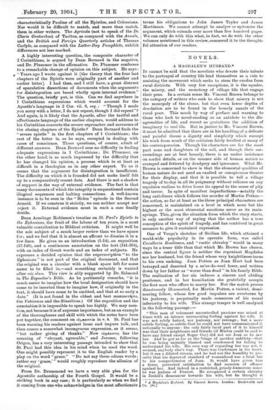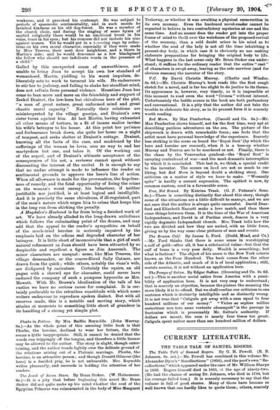IT cannot be said that the novelists who devote their
talents to the portrayal of country life lend themselves as a rule to
assisting the movement which seeks to stem the exodus from rural districts. With very few exceptions, it is the squalor, the misery, and the monotony of village life that engage their pens. In a certain sense Mr. Vincent Brown belongs to the category of writers who seek to show that misery is not the monopoly of the slums, but that even lower depths of desolation are to be found in the homely annals of the rural poor. This much by way of preface and warning to
those who look to novel-reading as an antidote to the dia- 1 agreeables of life, and resent as gratuitous the addition of imaginary to real ills. But in justice to Mr. Vincent Brown, it must be admitted that there are in his handling of a delicate and painful theme a dignity and simplicity which exempt his work from much of the criticism fairly levelled at many of his contemporaries. Though his characters are for the most part sons and daughters of the soil, and though their sur-
roundings are at best homely, there is no undue insistence on sordid details, or on the meaner side of human nature as cramped and fettered by drudgery and ignorance. What Mr. Brown is concerned to show is that the elemental qualities of human nature do not need an exalted or conspicuous theatre for their display, and that it is possible to tell a village
tragedy of to-day in all its poignancy without reliance on any repulsive realism to drive home its appeal to the sense of pity
and terror. In spite of manifest imperfections—notably the long anticlimax which follows the murder of Martin Potten- the action, so far at least as the three principal characters are concerned, is maintained on a level in which none but the highest or the most elemental emotions serve as its main- springs. This, given the situation from which the story starts, is only another way of saying that the author has a true conception of the spirit of tragedy, and has contrived in great measure to give it sustained expression.
One of Verga's sketches of Sicilian life, which attained a world-wide popularity in its operatic form, was called
Cavalleria Rusticana, and " rustic chivalry " would in many ways be a truer title than that which Mr. Brown has chosen,
since the central figure is neither the repentant Magdalen nor her husband, but the friend whose very knightliness turns to his own undoing. Joan Potten as Joan Hurt had been betrayed and deserted by a ne'er-do-weel lover, and written down by her father as "worse than dead " in his family Bible.
The realisation of her sin induces a sincere and abiding penitence, and in her humiliation she gratefully accepts the first man who offers to marry her. But the match proves disastrously ill-assorted, for Martin Potten, a violent, domi- neering fellow, whose few good impulses are overborne by his jealousy, is perpetually made conscious of his moral inferiority to his wife. This strange temper is well analysed in the following passage :—
" This man of vehement uncontrolled passions was seized at times with an intense unreasoning feeling against his wife. It was not solely hatred, nor jealousy, nor revenge ; but a moro subtle feeling, so subtle that he could not have communicated it rationally to anyone : the only fairly lucid part of it to himself was that their neighbours and friends (if Martin could be said to have any friend except Roger Coo) did not see Joan as he saw her. And he got as far as the fringe of another subtlety—that he was being unjustly blamed and condemned for failing to understand his wife. His own way of regarding her was not, it seemed, anybody else's way. There was tenderness in his heart, but it ran a diluted stream, and he had not the humility to per- ceive that his depraved standard of womanhood was a fatal bar to his comprehension of Joan. It would have given him a fierce, perverted satisfaction to find occasion of offence against her. And indeed in a restricted, grimly-humorous sense he was jealous of Draicot. He recognised a certain chivalry in Zeekel's demeanour towards his wife, but he thought it • .4 Magdalen's Husband. By Vincent Brown, London; Duckworth and Co, [Si.] weakness, and it provoked his contempt. He was subject to periods of spasmodic sentimentality, and in such moods he lavished kindness on his old dog-ferret. He was a member of the church choir, and during the singing of some hymn of morbid religiosity there would be an emotional break in his voice, tears in his eyes ; but his remorse did not include his sins against women. Yet he would get in a t.,wering rage by reflec- tions on his own moral character, especially if they were made by Miss Treeves, their next door neighbour, and a thorn in Martin's side ; and he would denounce as a low blackguard the fellow who should use indelicate words in the presence of a child."
Galled by this unexpected sense of unworthiness, and unable to bring Joan to accept his own low standard of womanhood, Martin, yielding to his worst impulses, de- liberately sets to work to torment his wife. He endeavours to stir her to jealousy, and failing to shake her steadfast mind, does not refrain from personal violence. Meantime Joan has come to lean more and more on the friendship and support of Zeekel Draicot, the low-born but chivalrous hero of the plot, " a man of great nature, great unformed mind and great chaotic moral capacity." Naturally their relations are misinterpreted by the village gossips, and Draicot's own sister turns against him. At last Martin, having exhausted all other means of torture, in a fit of insane malice invites his wife's betrayer to his house. At this point her patience and forbearance break down, she quits her home on a night of tempest, and seeks shelter at Draicot's cottage. Draioot, knowing all the facts of the case, and maddened by the sufferings of the woman be loves, sees no way to end her martyrdom but one, and takes it. Of the working out of the sequel, and of Draicot's ultimate acceptance of the consequences of his act, a reviewer cannot speak without discounting the interest of the recital. It is enough to say that no undue attempt is made to influence the reader on sentimental grounds to approve the hero's line of action. When all allowance is made for the provocation, the hopeless- ness of remedy, and the fatal opportunity of fixing the crime on the woman's worst enemy, his behaviour, if neither justifiable nor justified, is at least logical and intelligible.
And it is precisely the same chivalrous, if ill-regulated, part of the man's nature which urges hira to crime that keeps him in the long run from shirking the penalty.
A Magdalen's Husband is far from being a finished work of
art. We have already alluded to the long-drawn anticlimax which follows the culminating point of the drama, and may add that the appeal to the reader's sympathies on behalf of the much-tried heroine is seriously impaired by the emphasis laid on the odious and degraded character of her betrayer. It is little short of inconceivable that a girl of such natural refinement as Joan should have been attracted by so despicable and repellent a figure as Jim Anscomb. The minor characters are unequal : some, like Miss Treeves, the
village dressmaker, or the coarse-fibred Sally Calmer, are drawn from the quick ; while others, notably the vicar's wife,
are disfigured by caricature. Certainly the squire, an old pagan with a shrewd eye for character, could never have endured the company of such a pompous hypocrite as Mrs. Mewett. With Mr. Brown's idealisation of the talk of his rustics we have no serious cause for complaint. It is cer- tainly preferable to the relentless exactitude with which some writers endeavour to reproduce spoken dialect. But with all reserves made, this is a notable and moving story, which attains at moments to something little short of grandeur in its handling of a strong yet simple plot.











































 Previous page
Previous page